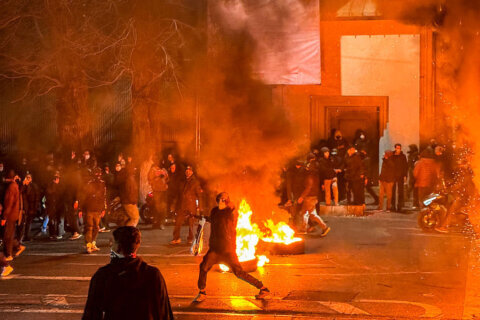WASHINGTON — Despite repeated warnings about prohibited items at U.S. airports, the problem persists and innocent mistakes may not be the only reason.
“Just a month or two ago, a record number of firearms were seized in carry-on luggage going onto airplanes here, and so they’re still very, very much a job for aviation security personnel in this country,” said Department of Homeland Security Secretary Jeh Johnson at a news conference Friday at Ronald Reagan Washington National Airport.
Johnson was referring to the Transportation Security Administration’s interception of a record 73 firearms from airline passengers’ carry-on bags in late April.
According to a TSA news release, “all but five of them were loaded.”
It surpassed the previous record number of 68 weapons seized in a single week set in October 2015.
“Unfortunately, these sorts of occurrences are all too frequent,” the TSA wrote in an April 25 blog post. “Each time we find a dangerous item, the line is slowed down and a passenger that likely had no ill intent ends up with a citation or in some cases is even arrested.”
And as DHS seeks to inform the public about the rules for transporting firearms, Fred Burton, vice president of intelligence at Stratfor, is concerned there could be nefarious motives at work.
“One of the fears you have is the possibility that these could, in some format, be test runs to see if an individual could secrete a firearm onto an aircraft,” Burton said. “I know if I were a TSA agent, just due to the volume of weapons that are being interdicted, that would be one of my concerns.”
But “the system is working,” Burton said. “TSA is interdicting and finding these firearms, so it looks to me the TSA is doing their job and finding these firearms before they’re getting up onto an aircraft.”
Johnson, while asking for passenger’s cooperation with TSA’s rules and patience during longer wait times, issued a warning.
“We will not compromise aviation security in the face of increased passenger volume,” Johnson said. “Our principal job here is the safety of the American public. That’s what we are obligated to do.”
DHS and TSA officials, since a string of aviation disasters started last October in Egypt, are intensely concentrating on inbound threats.
“We’ve been focused on security at overseas airports that are last point of departure airports,” Johnson said. “We went back and focused on that, even more after the events of Sharm el-Sheikh, to evaluate the security at various airports in the region and to evaluate and re-evaluate security at last point of departure airports.”
Metrojet Flight 9268, which took off from Sharm el-Sheikh airport, disintegrated over the northern Sinai Peninsula of Egypt on Oct. 31, 2015, killing 224 people headed to Pulkovo Airport in Saint Petersburg, Russia.
During another incident in Mogadishu, Somalia, a plane carrying 74 passengers was forced to make an emergency landing after terrorists detonated explosives in a laptop, blowing himself out of the plane at 11,000 feet in the air.
Mogadishu airport is not a point of last departure to the U.S., but the incident is still of great concern to U.S. officials nonetheless.
TSA Administrator Peter Neffenger told WTOP after the attack on Daallo Airlines flight D3159 on Feb. 3, that the agency is “paying very close attention to our processes, procedures and technologies designed to detect items that could harm an aircraft, damage an aircraft or destroy an aircraft.”
One of those procedures that’s been initiated, said Johnson, “is pre-clearance, where we forward deployed customs officers overseas.”
Pre-clearance is the process by which CBP officers stationed abroad screen and make admissibility decisions about passengers and their accompanying goods or baggage heading to the United States before they leave a foreign port.
“I hope the public understands there continues to be a concern about aviation security,” Johnson said. “We cannot … call it quits and go home. There are still concerns about aviation security.”






